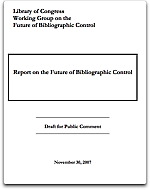Spent a bit of time today plowing through the recently released LC Working Group Draft Report on the Future of Bibliographic Control. It is an interesting document and I imagine there will be quite a few public comments.
I confess I’ve never been able to sustain my end of a theoretical conversation on cataloging but when I hit this set of paragraphs on page 24, well I began to think there might yet be hope:
Recently, there has been a proliferation of standards—both officially registered and de facto—prompted by the needs of digital materials and digitizing initiatives. While it is useful to continue the explorations embodied in such standards development, the library community needs to be much more focused on identifying and addressing real needs with workable solutions. Too much development is based on unvalidated assertions or professional ideology.
Our metadata environment is becoming extremely complex, comprehending AACR2/RDA, MARC 21, MARC XML, MODS, Dublin Core, and ONIX—amongst others. Our retrieval protocol environment is also complex, with Z39.50, SRW/U, MXG, and the need to work with OpenSearch and other protocol approaches. This standards proliferation is a distraction to national bodies, a confusion for practitioners, and a vexation for developers.
Leaving aside the fractured syntax of the second paragraph, could this excerpt actually represent a call for pragmatism? I hope so. I know more than once I’ve felt distracted, confused and vexed by what might charitably be called our profession’s proclivity to favor over-engineered solutions in response to least-use scenarios.
It will be interesting to see the reaction to this report.

